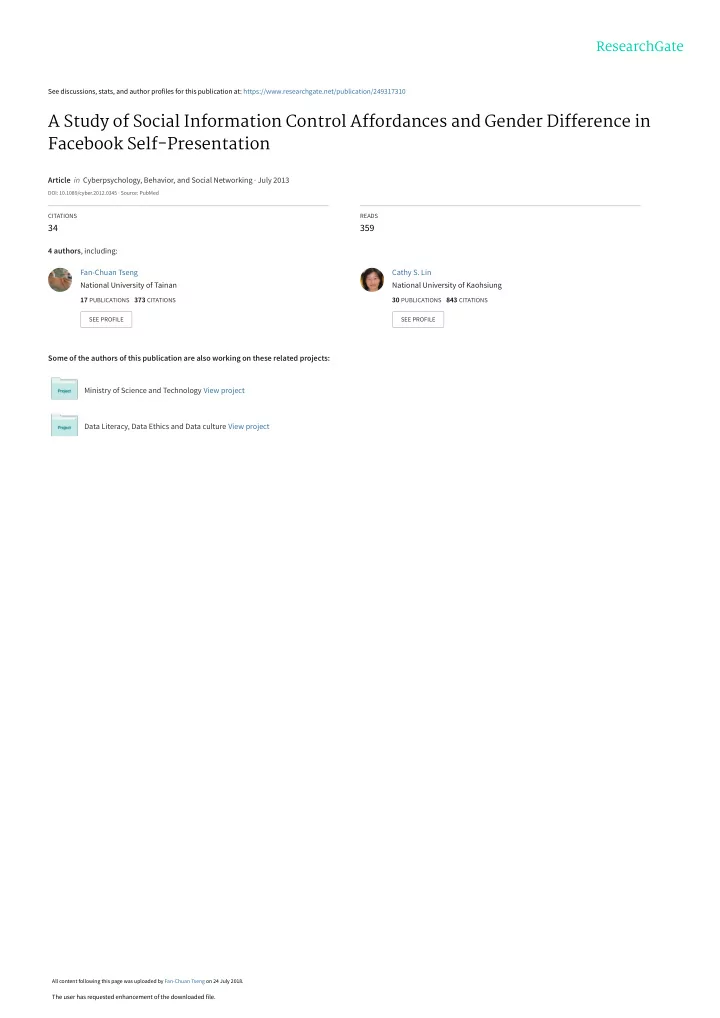

See discussions, stats, and author profiles for this publication at: https://www.researchgate.net/publication/249317310 A Study of Social Information Control Affordances and Gender Difference in Facebook Self-Presentation Article in Cyberpsychology, Behavior, and Social Networking · July 2013 DOI: 10.1089/cyber.2012.0345 · Source: PubMed CITATIONS READS 34 359 4 authors , including: Fan-Chuan Tseng Cathy S. Lin National University of Tainan National University of Kaohsiung 17 PUBLICATIONS 373 CITATIONS 30 PUBLICATIONS 843 CITATIONS SEE PROFILE SEE PROFILE Some of the authors of this publication are also working on these related projects: Ministry of Science and Technology View project Data Literacy, Data Ethics and Data culture View project All content following this page was uploaded by Fan-Chuan Tseng on 24 July 2018. The user has requested enhancement of the downloaded file.
Computers & Education 72 (2014) 37 – 47 Contents lists available at ScienceDirect Computers & Education journal homepage: www.elsevier.com/locate/compedu A study of social participation and knowledge sharing in the teachers ’ online professional community of practice Fan-Chuan Tseng a , Feng-Yang Kuo b , * a Department of Business and Management, National University of Tainan, No. 33, Sec. 2, Shu-Lin St., Tainan, Taiwan b Department of Information Management, National Sun Yat-Sen University, 70 Lien-Hai Road, Kaohsiung, Taiwan a r t i c l e i n f o a b s t r a c t Article history: To facilitate professional development of teachers in the online context, the online community of practice Received 14 June 2013 (CoPs) has become an important platform in which individuals with similar interests or common goals Received in revised form get together to share their resources, develop working strategies, solve problems, and improve individual 13 October 2013 as well as organizational performance. In this study, we have collected self-reported knowledge-sharing Accepted 14 October 2013 behaviors from 321 members of the largest online professional CoP of teachers in Taiwan. The results show that closer connections among online CoP members can lead to greater recognition of and altruism Keywords: towards others. Moreover, performance expectation and self-ef fi cacy belief play essential roles in Computer-mediated communication knowledge-sharing participation. Thus, the development of social relationships among online teacher Cooperative/collaborative learning members helps them obtain potential resources and reliable support through their social network. Also, Interactive learning environments teachers ’ membership in the online professional CoP fosters a prosocial attitude that heightens their Learning communities willingness to share useful resources and solve other members ’ problems, both emotionally and instrumentally. Consequently, knowledge-sharing behaviors, in terms of knowledge giving and knowing receiving, are signi fi cantly predicted by prosocial commitment and performance expectation respec- tively. The implications to both research and practice are provided in this paper. � 2013 Published by Elsevier Ltd. 1. Introduction Teacher empowerment has been a critical issue for teachers to update their domain knowledge and expand teaching skills in order to continue to work effectively with students ’ learning (Cochran-Smith & Lytle, 1999; Kao & Tsai, 2009; McLaughlin, 2002). A variety of ways have been employed to empower teachers. For example, one of the most frequently employed is to hire outside experts to inform teachers of possible best practices or up-to-date pedagogical knowledge. Yet, depending on outside experts who have little knowledge about local conditions may render teachers to become passive and isolated learners (Hur, Brush, & Bonk, 2012). Alternatively, teachers may prefer developing teaching skills that work best for them in their individual classroom, which unfortunately leads to cultures of knowledge hoarding and fortifying the boundaries between classrooms and teachers (Carroll et al., 2003). More recently, a growing number of in- formation and technologies (ICTs) have been implemented for teachers ’ greater teaching ef fi ciency in the classroom (Lee, Wu, Michko, & Lin, 2013; Türel & Johnson, 2012) as well as engagement in professional growth (Ottenbreit-Leftwich et al., 2012; Ottenbreit-Leftwich, Gla- zewski, Newby, & Ertmer, 2010). Among various ICTs for education, online communities of practices (CoPs) have become a critical approach for teachers to advancing their pedagogical knowledge and teaching skills (Ferrell, Fraedrich, & Ferrell, 2008; Gairin-Sallan, Rodriguez- Gomez, & Armengol-Asparo, 2010; McKnight, Choudhury, & Kacmar, 2002). A CoP refers to ‘ a set of relations among persons, activity and world ’ in which people are bound together by shared expertise and passion for a joint enterprise or goal (Wenger & Snyder, 2000). Studies have shown that the online CoPs can help raise teacher-practitioners ’ competence levels, reinforce their professional practice, and satisfy the need of professional development as well as students ’ academic achievement (Clarke, 2009; Meneses, Fabregues, Rodriguez-Gomez, & Ion, 2012; Zahner, 2002). * Corresponding author. Tel.: þ 886 7 5254731. E-mail addresses: misfctseng@gmail.com (F.-C. Tseng), bkuo@mis.nsysu.edu.tw (F.-Y. Kuo). 0360-1315/$ – see front matter � 2013 Published by Elsevier Ltd. http://dx.doi.org/10.1016/j.compedu.2013.10.005
Recommend
More recommend